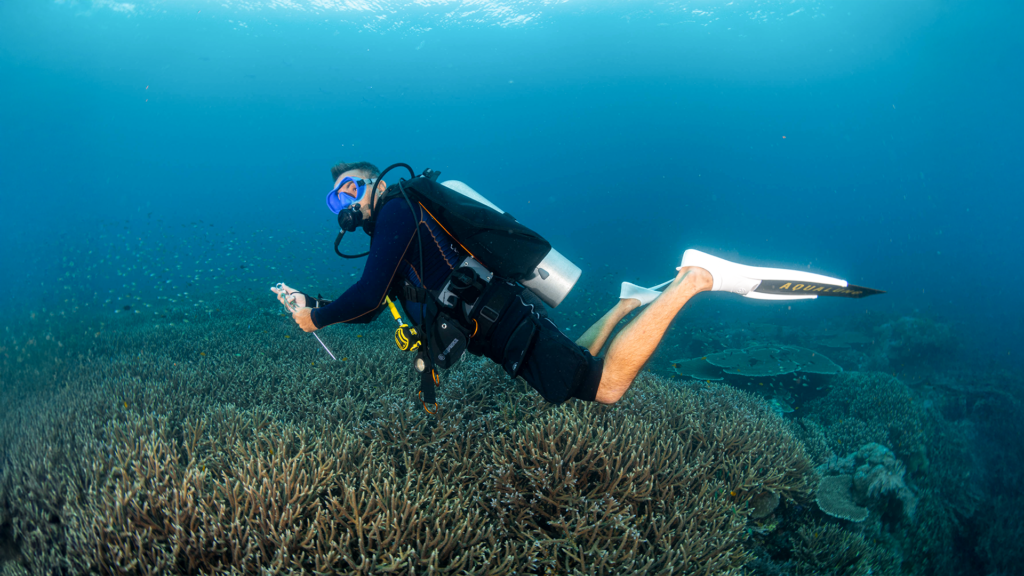
For most divers, embarking on a liveaboard journey is the ultimate dream—a chance to explore far-off underwater worlds through Maldives liveaboard, Banda Sea liveaboard, or Raja Ampat liveaboard. From swimming alongside manta rays to marveling at vibrant coral reefs teeming with life, these trips offer unforgettable, once-in-a-lifetime experiences.
Though these excursions are exciting, safety is the secret to savoring every minute as you negotiate the depths of these immaculate underwater habitats. Having decades of knowledge guiding divers on Red Sea liveaboard diving and Egypt liveaboard tours, at DUNE Liveaboard we know that preparation and caution open the path to spectacular experiences.
This article offers basic safety advice to improve your liveaboard vacation and guarantee that your trip to locations such as the Banda Sea is not only unforgettable but also safe.
Here’s What’s Covered in This Article:
- Plan Ahead: Prep for Maldives, Raja Ampat, and Banda Sea trips.
- Trusted Operators: Pick licensed, reliable dive guides.
- Inspect Gear: Check all equipment before diving.
- Carry Safety Gear: Use signal devices for emergencies.
- Know Limits: Dive within your skill level.
- Eco-Friendly: Protect marine life and reefs.
Preparing for a Safe and Enjoyable Liveaboard Adventure
Before embarking on a thrilling liveaboard, careful planning is essential. This isn’t just any holiday—it’s an immersive experience requiring forethought. Whether you’re heading to the exotic reefs of Raja Ampat, dramatic wrecks in the Red Sea, or diverse marine ecosystems in the Maldives, understanding the unique challenges and requirements for liveaboard trips will be your first step towards an incredible and safe experience.
1. Understand the Challenges of Each Location
- Strong Currents
Destinations like Raja Ampat and the Banda Sea are known for their beauty, but they are also renowned for their strong currents. Ensure that your skill level matches the challenges of your chosen site.
- Varying Depths
The dramatic underwater landscapes in places such as the Maldives and Egypt mean you’ll encounter diverse depth variations. Beginners should stick to shallower sites, while advanced divers can explore more complex environments.
2. Monitor Weather Conditions and Follow Crew Guidance
Weather in remote areas can change unexpectedly, often with little warning, especially in regions like the Maldives or the Red Sea. Strong winds, sudden storms, or rough seas can quickly impact diving conditions. Trust your crew – they have extensive experience and in-depth knowledge of local weather patterns. They are trained to assess the situation and make decisions to keep you safe. Pay close attention to their guidance, whether it’s about postponing a dive or changing locations, as they prioritize your safety above all else.
Essential Documents and Trusted Operators
3. Prepare Vital Documentation
Make sure all of your vital paperwork is in order before leaving to far-off diving sites like the Banda Sea or Raja Ampat. Always pack your passport, visa, and any necessary regional permissions. Remember your specific diving insurance, which is absolutely vital for diving in remote locations distant from medical services. Comprehensive insurance will cover treatments including decompression or evacuation in the case of an emergency. These are essential actions to guarantee your readiness for unanticipated situations and enable peaceful diving.
4. Choose Licensed and Trusted Operators
A good and fun diving experience depends on choosing the correct diving operator. Choose reliable and licenced operators, such those approved by PADI or SSI. These companies offer premium, well-kept equipment and implement rigorous safety procedures. Their employees are also highly skilled experts who can help you through safe diving techniques and guarantee your comfort all through your adventure. Selecting approved operators not only guarantees your own safety but also supports ethical travel policies, therefore safeguarding the delicate marine environments that make remote diving so remarkable.
Tips for Enjoying Liveaboard Travel Safely
5. Experienced Guides Make All the Difference
A experienced guide shares insights about the local ecology, therefore enhancing your experience rather than only increasing your safety. For example, the rich biodiversity of Raja Ampat—which boasts uncommon marine life and breathtaking coral reefs—is best seen under the direction of a professional who knows the topography, challenging currents, and animal behavior. These guides can also help you find hidden treasures—like remote dive sites or disguised animals—which you might otherwise overlook. Having someone by your side can make an everyday trip an amazing adventure.
6. Respect Your Limits
Diving in far-off places like the Banda Sea may be exciting but also demanding. Because of their erratic nature, these areas may demand ongoing self-awareness. Knowing your own level of ability is crucial; avoid pushing yourself too far since it could damage your group as well as yourself. Tell your guide straight forwardly if you are fatigued, confused, or anxious. They are there to make sure everyone has a safe, fun time. Remember, responsible diving not only keeps you safe but also helps to create a more comfortable group dynamic.
7. Research Sites Beforehand
Understanding your dive destination is crucial. For example, Egypt offers calm seas and fascinating wrecks that are perfect for beginners looking to build confidence. On the other hand, Raja Ampat’s strong currents and advanced dive sites can be challenging even for seasoned divers. Researching these locations in advance allows you to select sites that match your skill level and comfort. It also gives you the chance to learn about the unique marine life you might encounter, making your dives even more rewarding.
Dive Smart with the Right Equipment

8. Inspect Diving Gear Thoroughly
Your equipment is your lifeline underwater, so inspecting it before each dive is non-negotiable. Check everything—from your regulator to your buoyancy control device (BCD) and fins—to ensure it’s functioning properly. If something feels off or isn’t working as it should, don’t hesitate to ask for a replacement. Even minor issues can become major problems underwater. Investing a few extra minutes in inspection can make the difference between a smooth dive and a dangerous situation.
9. Carry a Surface Signal Device
Safety continues long after you emerge. Carrying a surface signal device such as a safety sausage, whistle, or even a signaling mirror in open water might literally save lives. If you drift too far or require aid, these instruments enable you to draw in your boat crew. Particularly in places with strong currents or large stretches of water, your safety depends on a consistent means of signaling for aid.
Responsible Tourism and Sustainable Practices
10. Respect the Marine Environment
Though the beauty of places like the Maldives or Banda Sea is unparalleled, tremendous privilege also carries responsibilities. Visitors have to give conservation initiatives first priority if we want to preserve these delicate ecosystems. Steer clear of touching coral reefs; even small touch can harm or upset marine life. Keep a safe distance from aquatic life to guarantee you not interrupt their normal activities. Following leave-no- trace guidelines always helps you to minimize any effect on the surroundings by always carrying all litter with you. Responsible travel helps protect underwater paradise for next generations of divers to enjoy.
Practical Considerations Onboard

11. Understand Medical Limitations
Some remote locations may lack adequate medical facilities, making it essential to be prepared for potential emergencies. Be sure to pack a comprehensive first-aid kit with items like bandages, antiseptic, pain relievers, and any personal medications you may need. Additionally, research in advance to know where the nearest medical facility or evacuation service is located. Prevention is key—take steps to mitigate risks by staying hydrated, avoiding overexertion, and being cautious about potential hazards like sharp coral or wildlife encounters.
12. Prioritise Healthy Eating
Good nutrition is vital on extended trips, especially when engaging in physically demanding activities like diving. Notify your crew about any dietary preferences or allergies well in advance to ensure proper meal planning. Pack healthy snacks, like nuts, granola bars, or dried fruit, to keep your energy levels up between meals. Staying nourished is essential for maintaining focus, stamina, and overall health during long voyages and multiple days of intense dives.
13. Stay Calm in Emergencies
Even with the best precautions, emergencies can occur while on the water. Staying calm in these situations is crucial for ensuring everyone’s safety. Practice mindfulness techniques or deep breathing exercises to help manage stress in tense moments. Clear thinking allows you to follow emergency protocols and crew instructions effectively. Remember, your ability to remain composed can have a ripple effect, helping others in the group stay calm and work together to resolve the situation.
14. Regular Communication with Crew
A safe and fun tour depends on effective crew communication. Tell them always of your intentions, whether they are sticking near the deck, snorkeling off the boat, or exploring a surrounding region. This guarantees immediate support when need and enables them keep track of every person on board. To keep open lines of contact, set up a system with planned check-ins or a whistle or hand signal system. A knowledgeable staff can enable everyone to experience a better quality and a safer surroundings.
Ask the Right Questions Before Booking
Choosing a liveaboard operator carefully is crucial for your safety and enjoyment. Ask about their safety standards, dive equipment maintenance, and onboard medical facilities. Knowing their protocols will give you peace of mind and confidence that you’ve selected a reputable operator for your adventure.
Explore the Depths with Confidence
DUNE Liveaboard is dedicated to provide diving experiences as exciting as they are safe. Our first concerns are your safety and happiness whether your exploration is of the unspoiled beauty of the Banda Sea, the vibrant, multicolored reefs of Raja Ampat, or the captivating underwater treasures of the Red Sea. Traveling to some of the most amazing sites on Earth is a journey of a lifetime; we are here to ensure that every moment is flawless and unforgettable.
Our knowledgeable staff is committed to helping divers of all skill levels provide expert advice, modern tools, well chosen trips meant to envelop you in the enchantment of the underwater world. Emphasizing pragmatic safety, we make sure you may dive with confidence and totally enjoy the beauty and magic of these immaculate underwater habitats. About ready to start your next trip? Choose DUNE Liveaboard and let us assist you to make lifetime moments.



